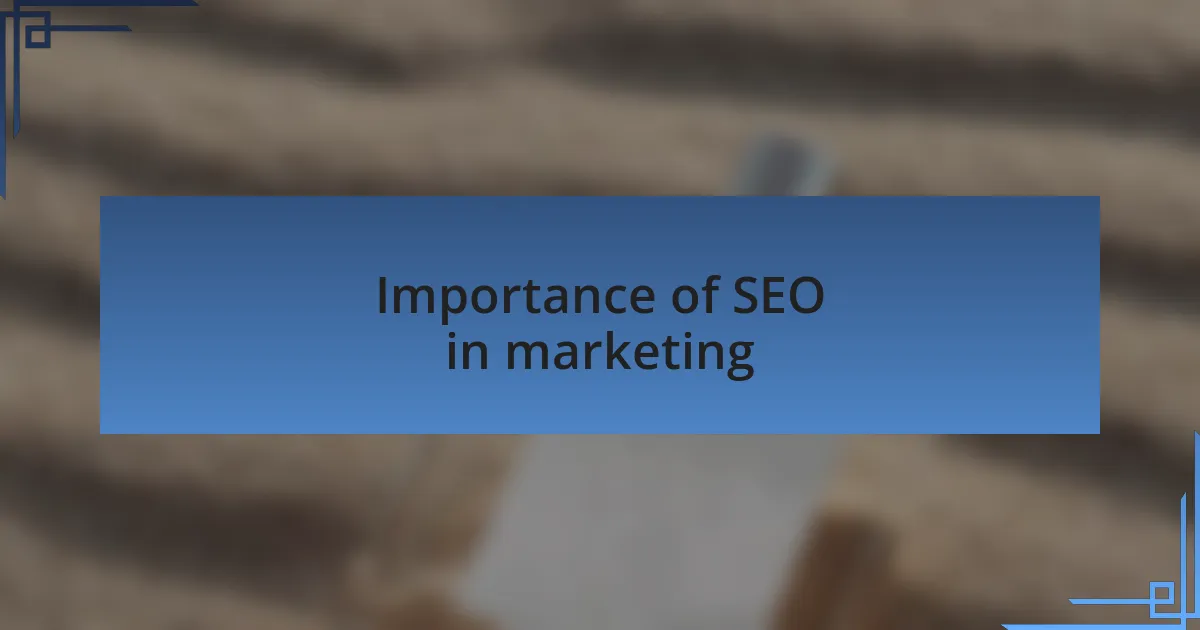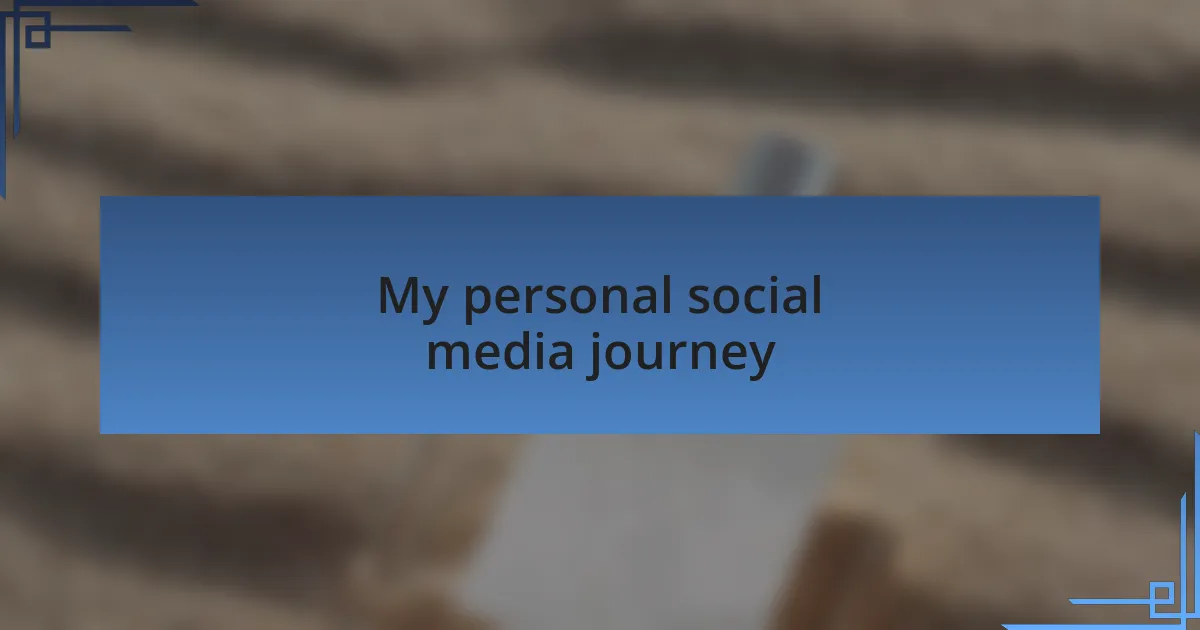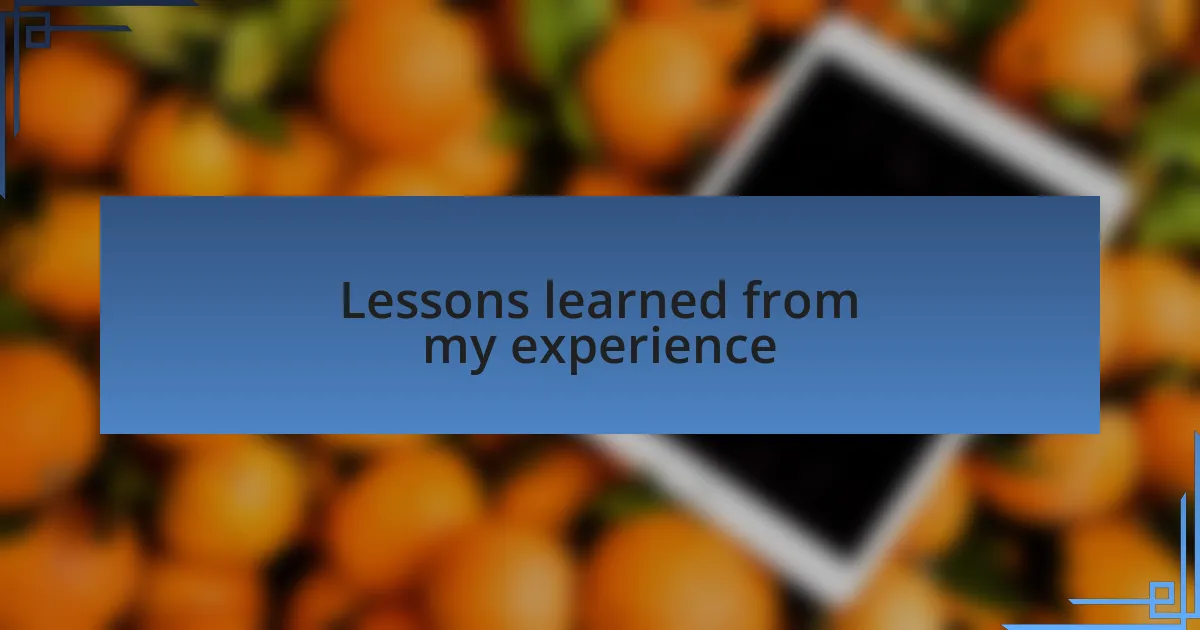Key takeaways:
- Social media significantly enhances a brand’s online presence and SEO, driving organic traffic through engagement and backlinks.
- A strong SEO strategy is essential for marketing success, improving visibility and credibility while aligning with audience needs.
- Consistency in posting and authentic interactions with followers foster community and boost engagement, impacting overall results positively.
- Utilizing analytics helps refine content strategies, allowing marketers to tailor their approach based on audience preferences and engagement metrics.
Understanding social media’s role
Social media is more than just a platform for casual networking; it plays a critical role in shaping a brand’s online presence. I recall my early days working with a client who underestimated the impact of social media on SEO. After implementing a few targeted social media strategies, we noticed a significant uptick in organic traffic, which left both of us pleasantly surprised. Isn’t it fascinating how a single post can lead to increased visibility?
When I think about the power of social media, it’s hard not to feel a rush of excitement. Each share, comment, or like amplifies the reach of your content, generating valuable backlinks and enhancing your authority in search engines. Remember the last time you stumbled upon a brand because someone shared their post? That moment is a testament to social media’s potent ability to drive traffic, isn’t it?
Additionally, social media enhances engagement by fostering a community around your brand. I’ve often found that when I engage with my audience on platforms like Instagram or Twitter, I receive real-time feedback that helps me refine my approach. Isn’t it rewarding to see how those genuine interactions translate into higher search rankings and a loyal following? Through this dynamic, social media proves its essential role not just as a promotional tool, but as a vital component of a comprehensive SEO strategy.

Importance of SEO in marketing
The importance of SEO in marketing can’t be overstated. I remember working with a startup that had tremendous potential but struggled to find its audience. By optimizing their website for search engines, we improved their visibility, which led to increased interest and ultimately sales. Isn’t it remarkable how a well-optimized site can turn a hidden gem into a flourishing business?
SEO isn’t just about keywords and rankings; it’s about understanding your audience. During one campaign, I took the time to analyze search patterns and social media discussions. This deep dive revealed what prospects truly valued. It was enlightening to see how aligning our content with their interests led to higher engagement and better conversion rates. Have you ever considered how much your audience’s needs influence your marketing strategy?
Moreover, a strong SEO strategy builds credibility. I once had a client who was wary of investing in SEO, citing concerns over costs. Once we achieved first-page rankings, that skepticism transformed into trust. It was incredible to witness how appearing at the top of search results not only boosted traffic but also enhanced their reputation. Isn’t it true that being found easily online makes a brand feel more trustworthy?

My personal social media journey
I’ve always been intrigued by social media, and my journey began with a simple curiosity. I created my first account not just to connect with friends but to explore how brands were using platforms to engage audiences. As I scrolled through my feed, I noticed the power of storytelling—how businesses could captivate and convert followers by sharing their narratives. It made me ask myself: How could I harness that same magic for my own projects?
As I ventured deeper, I realized that social media wasn’t just about posting pretty pictures; it was about strategy. I remember analyzing which types of content generated the most reactions. One evening, I tested a video format on my account, and the engagement skyrocketed. It was exhilarating to watch comments flood in and to see my followers feel connected to the message. Have you ever felt that rush when your content resonates with someone?
My evolving relationship with social media has transformed my approach to SEO. I began leveraging these platforms not only for engagement but also to enhance search visibility. By sharing snippets of blog posts and linking back to my site, I saw an increase in organic traffic. It’s a fascinating cycle: the more I engage on social media, the better my SEO results become. Doesn’t it make you rethink how interlinked these channels can be?

Lessons learned from my experience
Through my journey, I learned that consistency is key. I remember a period of time when I was posting sporadically; the results were disheartening. However, once I committed to a regular posting schedule and engaged with my audience consistently, I saw a remarkable shift in both my engagement and website traffic. Isn’t it interesting how just a bit of discipline could lead to such significant results?
Another lesson was the importance of authentic interaction. Early on, I focused solely on broadcasting my content without really connecting with my followers. It felt like talking into a void. When I started responding to comments and sharing anecdotes directly related to their interests, the connection deepened. My followers began to share their stories, creating a vibrant community. Have you considered the power of building genuine relationships over just promoting your brand?
Lastly, I discovered that analytics should be my best friend. I initially viewed my social media metrics as intimidating numbers. After a few months of digging into what worked and what didn’t, I was able to tailor my content effectively. For instance, I noticed that posts with behind-the-scenes glimpses of my work sparked lively discussions. Embracing these insights allowed me to refine my strategy continuously. How often do you pause to look at your analytics and really understand your audience’s preferences?